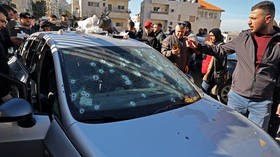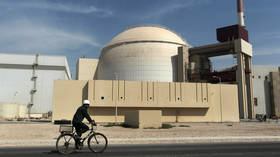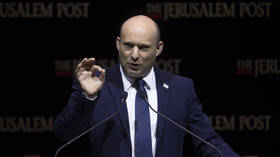Israel’s ‘assassination’ of three suspected Palestinian fighters will only spark more violence

The incident has been described by some members of the Israeli Knesset as an ‘extrajudicial killing’ and has provoked a large Palestinian response throughout the occupied territories.
Israeli Prime Minister Naftali Bennett triumphantly announced that “The Yamam [Israeli special forces], Shin Bet [Israeli intelligence], IDF – our forces proved today, once again, that there is no immunity for terrorists.”
“Whoever harms us, will be targeted,” he said, commenting on the killing of three alleged Palestinian militants who planned further attacks on Israeli forces. The three Palestinians killed were Ibrahim Al-Nabulsi, Adham Mabrouk, and Muhammad Al-Dakhil, all from the area of Jabal al-Nar, in Nablus. The Israeli assassination took place in broad daylight and is the first of its kind in years inside the West Bank, representing an unprecedented shift in the violent approach that Israel vows to continue to take in order to put down armed groups in the occupied territory.
In response to the attack, the Palestinian Authority (PA), an Israeli security coordination ally that had allegedly pursued the same armed cell before, called for an international probe into what they called a “heinous crime.” Furthermore, Nablus’ governor, Ibrahim Ramadan, called for a comprehensive strike in the city in protest of the assassination, whilst Israel has announced it is continuing the same operation until it finds the fourth member of the armed group they are pursuing. In response, Israeli Knesset member, Sami Abu Shehadeh, condemned the“extrajudicial execution against three Palestinian youths,” lashing out at the Israeli media and public for “accepting the army’s narrative and constantly echoing it through all media.”
“The blood of [our] martyrs will not be wasted, and the response will come, God willing, and blood will be met with blood,” said the Al-Aqsa Martyrs brigades, an unofficial military wing connected to the Palestinian Fatah Party, to which the three Palestinians killed allegedly belonged. Additionally, the Palestinian Islamic Jihad (PIJ) party called for an escalation with Israel and for revenge to be taken, as Hamas, the ruling party of the Gaza Strip, called for mass participation in the funeral of the slain Palestinians and an uprising.
The Israeli military accuses the three Palestinians it assassinated today of conducting at least four shooting attacks against Israeli soldiers and settlements in the north of the occupied West Bank. Shooting attacks against Israeli forces, specifically in the Jenin and Nablus areas, have become a near daily occurrence in past months, sparking largescale Israeli arrest campaigns along with similar crackdowns from the Palestinian Authority’s security forces. Yet, these efforts have largely failed to deter the frequency with which small Palestinian armed cells attack Israeli forces, often unsuccessfully and not resulting in injuries or deaths.
This Tuesday’s assassination attack comes against the backdrop of the uptick in Palestinian armed activity against Israel in the West Bank, which is believed to have been sparked by the erosion of trust in the Palestinian Authority and the desperation felt by Palestinians under occupation. Understanding this, it makes sense that retaliatory violence, expected by Israeli and Palestinian analysts, will soon come from Palestinian armed factions in the West Bank. This Wednesday, there is also a ‘day of rage’ organized by Palestinians across the West Bank, who are calling on mass participation in a march in central Ramallah, which will then head towards the Israeli settlement of Beit El to confront Israeli forces. Tuesday night, demonstrations also erupted around Nablus, Ramallah, and al-Khalil, following the funeral procession attended by tens of thousands in Nablus.
Calls by demonstrators of “revenge is revenge” and urging “Saraya [referring to PIJ’s armed wing] and al-Qassam [Hamas armed wing]” to retaliate from Gaza for the killings were also broadcast across Palestinian media. This has caused some debate on whether Gaza’s armed groups will in fact act against Israel. This could happen, but it is not likely as of now and will depend upon the severity of the escalation inside the West Bank.
Hamas, which rules the besieged Gaza Strip, would like nothing more than an armed uprising in the West Bank and the beginning of a new Intifada, so will jump on any opportunity to back this effort up. But, for the armed groups in Gaza, including Hamas, it would not be strategically intelligent for them to immediately launch rockets and provoke war with Israel. If Hamas is going to launch rockets from Gaza, the West Bank will have to explode with violence first.
For Israel, it seems like it has changed the rules of engagement inside the West Bank. Since the end of the Second Intifada, assassinations like this Tuesday’s in response to armed cells have not been the norm in the West Bank. That is why these killings mark a turning point which could indicate the beginning of a wave of violence not seen since the mid-2000s. Israel may have been seeking to send a message to small armed cadres in the West Bank that they will pay the ultimate price for non-lethal attacks on Israeli forces as a means of deterring further activity, yet it is unlikely that this will do much more than encourage further action from Palestinians.
Whatever the end result here, this Tuesday’s action by Israeli forces has opened up a new violent chapter in the West Bank conflict, one which may be out of anyone's hands at this point. What happens next depends entirely on how far the clashes between Palestinian youths and Israeli occupation forces escalate in the coming week.
The statements, views and opinions expressed in this column are solely those of the author and do not necessarily represent those of RT.

















